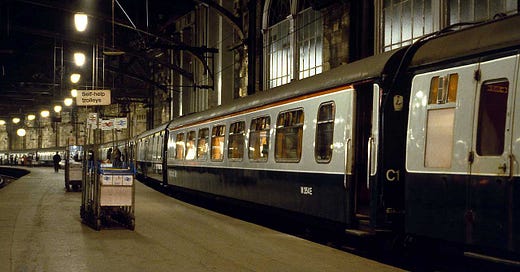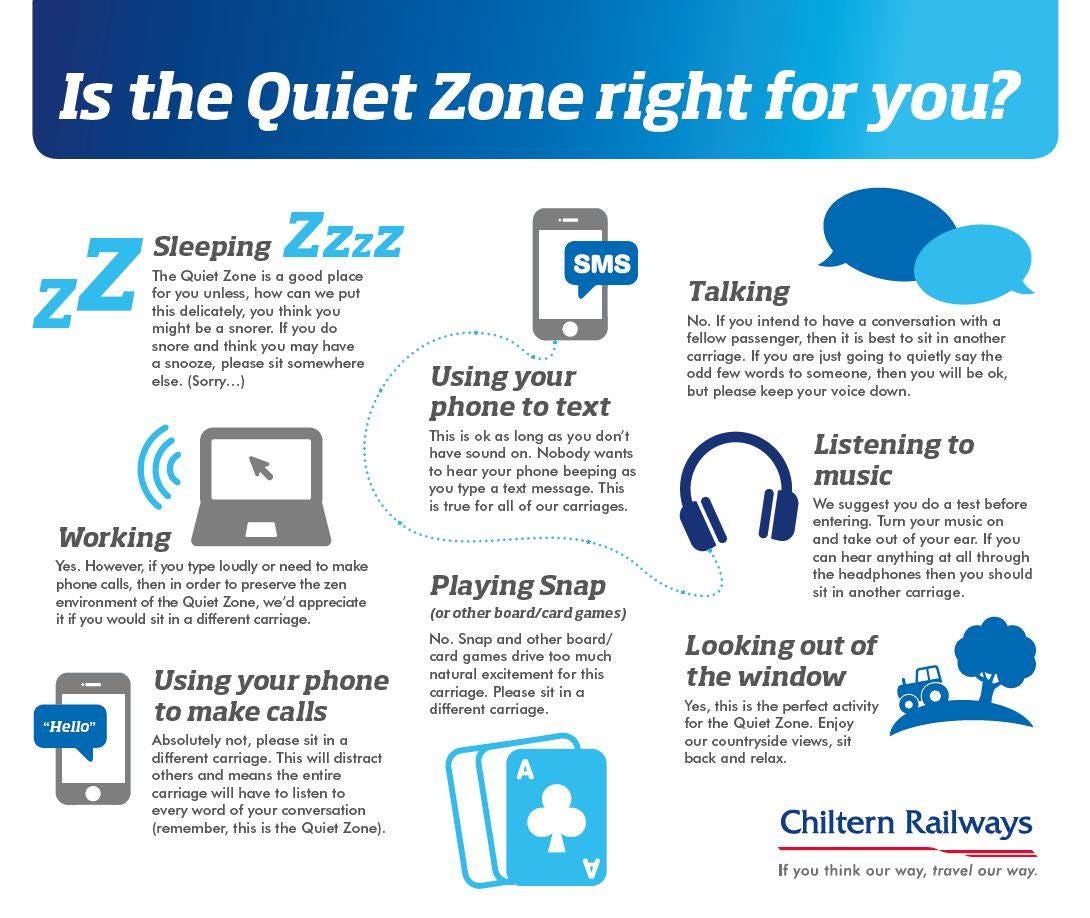I don’t travel by train nearly as often as I should, or would like to. But as an art student 20 years ago I lived in Carlisle and then London, so traveling back home to Edinburgh was a fairly frequent thing. Nowadays, too, I occasionally visit home and have made various excursions around the country. So, I do have some experience of Britain’s railway system and its lovely stations and several of the train companies.
On longer journeys, a British train will have, in addition to the many normal carriages, several unique ones. These are the buffet carriage, the First Class carriage (of which there are sometimes several), a cycle carriage for storing bicycles, and finally the “quiet carriage”. Of course, in my youth, there was also the beloved smoking carriage, but let’s leave the past aside and consider the future.
The buffet carriage inevitably will remain, unless technological change somehow renders it obsolete. Yes, there is the trolley that goes up and down the entire length of the train, but that’s just not the same as having a buffet carriage that you can actually go to. This forms a little adventure with which you can “break up” the journey. It also enables the selling of hot food which is not feasible with the trolley.
The cycle carriage certainly will remain. It’s worth noting that it is usually divided, with one half being normal seating for passengers. I wouldn’t be surprised if this is actually expanded in future to accommodate more bicycles.
By contrast, the First Class carriage might well be done away with. This would be in keeping with the hard egalitarian drive of our culture. Already, First Class is in distinction to, not “Second Class”, but “Standard”. This is a sop to those of us, like myself, who can’t afford First Class but don’t want to consider ourselves poor. It assuages the feelings of resentment we might otherwise have towards the passengers in First Class. The next step will be to get rid of First Class entirely.
But, long before that happens, I believe we will see the demise of the quiet carriage.
So what is the quiet carriage? Various train companies have it, but we will let LNER explain:
If want to catch up with work, read, or have a doze, you’re more than welcome in our quieter carriage.
You’ll find our havens of peace in carriage B or H (depending on the train).
If you’re in the quieter carriage, please keep the noise down. Music through headphones should be kept quiet enough as to not disturb other passengers and conversations should be conducted quietly. If you do have to make or take a call, please move into the end of the carriage through the doors before dialling or answering.
There is no First Class quieter carriage, though generally, they are quieter than Standard.
(A quick tangent. Note that LNER have already augmented “quiet carriage” to “quieter carriage”. This changes it from absolute to relative. They have made it non-binary, you could say.)
(Another tangent. Note the admission by LNER that First Class carriages are usually quieter than Standard class, even without any request that passengers be quiet. This is interesting, and relevant to why I think the future of the quiet carriage is in doubt. We’ll get to that later.)
Here is a different train company, Chiltern Railways, explaining the quiet carriage with an infographic:
The idea is clear: the quiet carriage is one reserved for people who want some peace and civility. It’s for people who don’t want to listen to trashy music from other passengers, or their bafflingly inane conversations with each other, or them talking absurdly loudly on their phones. It’s for people who don’t thrive in chaos and noise. It’s for people who have thoughts to think, or material to read, or business to attend to that requires mental focus. In short, it’s for people who are not stupid. You could even say, people who are civilised. The quiet carriage is a way to escape the riff-raff without paying for a First Class ticket.
What we see across all areas of culture is a trend of homogenisation - sometimes to the average, sometimes to the low end (but never to the high end). But even the average is a downgrade for many people, namely those at the higher end.
What we see across all areas of service is genericisation. There is one version of the service, and there are no variants, options or add-ons. (There is one Uber app and there is one way to use it, and that’s it.) “Take it or leave it” is the full range of your consumer choice, and if you choose to leave it, you will find that the company’s rivals offer the exact same service, so you’d have been better just paying ya money and taking ya “choice” at the original place.
With this in mind, you can imagine the arguments that will be used to justify getting rid of the quiet carriage. Until 2018, Virgin Trains offered Standard, Standard Quiet, First Class, and a very bespoke carriage indeed: First Class Quiet. Then they decided to do away with First Class Quiet. Here is how they sold the change to their customers:
This will give you more flexible space and greater freedom.
There will now be one more ordinary First Class carriage. So indeed, First Class passengers now have more choice between carriages. The trouble is that the choice is between identical carriages. There is nothing to choose between them! So what use is this “greater freedom”?
Looking ahead, the same argument could be used to get rid of the quiet carriage in Standard class. Why not? After all, it would give the passenger more flexible space and greater freedom, right? All passengers, not just those who value quiet, will now have an extra carriage to choose, should it for some reason appeal to them despite being identical to all the other carriages. Why should the choice of that particular carriage be limited to only those passengers who enjoy quiet? That’s discriminatory and, when you think about it, straight up dumb, dude! No, open up that carriage to all passengers. That is true democratising of consumer choice: nullifying the difference between options entirely, so that everyone can choose anything.
But this is sophistry. In truth, they are unlikely to use this argument, even though it would tally with that 2018 announcement from Virgin.
Then there is this argument, about the difficulties of deciding what is “quiet”?
IMHO, the problem is one of degree. Absolute silence is clearly unreasonable, but deciding what is a reasonable noise level in the quiet carriage is open to widely differing views.
In other words, if we can’t define it precisely, how can we insist that people adhere to it? I’d say that, like porn, you know it when you see it.
But in any case, the supposed difficulty of defining “quiet” will likely not be the reason for abolishing the quiet carriage.
Neither will it be that only a subset of passengers will use such a carriage. Consider the cycle carriage. It is a special provision for what will only ever be a small subset of passengers. So why is it not in danger? Because that subset is defined by a physical trait. Moreover, it is a trait that any passenger could decide to adopt (by becoming a cyclist). But the quiet carriage… Well, that’s a different matter.
We all know what the reason will be.
The existence of the quiet carriage acknowledges that some people prefer quiet. This implies that noise, chaos and equality can be undesirable. To accommodate such people is to dignify their snobbery. It is to laud contemplation, reading, writing, and other activities beloved by people who are “up themselves”. These are people who want to separate themselves from the majority. They think they are better than the hoi polloi. (Their thinking this is objectionable because, at least in some ways, it is certainly true - and everyone knows it.)
Moreover, there are wealthy people who have no use for quiet. They are rare but becoming less so all the time. Increasingly, wealthy people are shallow and stupid. Such people will also be offended by the quiet carriage as it is an affront not to their bank account but to them. In fact, they will be even more offended by it than poorer people, because it emphasises how much they are not living up to their, ahem, station.
The First Class carriage speaks of overt, crass, financial elitism, whereas the elitism of the quiet carriage transects the classes, speaking down potentially to everyone. This is much more dangerous. It acknowledges the virtue, not of being wealthy, but of being thoughtful. In theory, any dumpling can become wealthy… but being thoughtful is a quality granted only to a few, and it is granted not by decision, not by action, but by nature. You can’t fake it, you can’t manufacture it. All you can do is brush it aside, out of view, and not reward it with recognition nor facilitate it with special provision in public life.
That is why I believe the quiet carriage will have to go.
In closing, I should make the perhaps surprising admission that I myself actually don’t have a history of using the quiet carriage. The main reason is I worry I would inadvertently spoil the atmosphere for other people by being too noisy myself. But also, eavesdropping on other people’s conversations can be interesting, stimulating, except in dire circumstances such as those pictured earlier. In a way it reminds me of my early twenties when I used to sit in pubs and do creative writing, gently accompanied by the ambience of pub chatter around me. On those occasions when I want to be alone, what I do is take that seat in the little compartment at the end of a carriage. It’s like being in the kitchen at a party - people come and go, passing through for this or that, and you can say hello to them, but most of the time you are alone with your thoughts.
But the quiet carriage is a tradition that I value, so perhaps I should begin selecting it on future journeys so as to show support.
As the shopping cart problem is a measure of an individual, this might become a measure of a society: if its trains have quiet carriages, things are better than if not. Indeed, the appreciation of quiet is the difference between barbarism and civilisation, because it is only in quiet that the mind can wander freely.










For some reason this reminds me why going to the cinema isn't a pleasant experience anymore...
Long live the quiet supremacists.